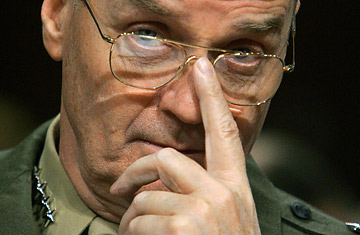
James Jones Jr.
A year ago it would have seemed all but impossible. Barack Obama, the Democratic presidential candidate with the earliest and most outspoken record of opposition to the war in Iraq, wouldn't name the man who led the Marines during the run-up to the war — and who failed to publicly criticize the operation's flawed planning — as his closest national security aide.
But he has. And it's a testament to both Obama's needs as a young and untested Commander in Chief and the political abilities of General James Jones, Marine Corps commandant from July 1999 through January 2003, that Jones will fill one of the most powerful positions in the country: National Security Adviser. At first glance, Jones doesn't make a lot of sense as the man to help Obama through his now familiar litany of challenges: wars in Iraq and Afghanistan, a global antiterrorism campaign, Iran's pursuit of nuclear weapons, rising India-Pakistan tensions and a moribund Middle East peace process. Add to that list a new, self-created challenge: the selection of Hillary Clinton and Robert Gates — two smart, strong and politically opposed people — to head the traditionally antagonistic State and Defense departments.
Obama doesn't really know Jones. Back in October, then candidate Obama said he valued Jones' advice, but in fact he had only spoken with him twice, and Jones was never in his close circle of advisers during the primaries or the general election. Jones' political affiliation is not clear, though he has never been called a Democrat. His lack of public complaint during the planning for the Iraq war drew criticism despite later reports that he had argued with Donald Rumsfeld and then Joint Chiefs Chairman Peter Pace. But those who know Jones say his strengths vastly outweigh his perceived weaknesses. In Jones, Obama gets someone with an instant and deep understanding of military plans and details. He gets a 6-ft. 5-in. Marine Corps veteran who has firsthand experience of combat theaters from Vietnam to Bosnia, and who has earned a Defense Distinguished Service Medal, a Silver Star and a Bronze Star with V for valor. While the uniformed military will follow the orders of the Commander in Chief no matter what, the public is more likely to support those orders when they are being enforced by a decorated veteran with a long career on the battlefield.
Equally important, Jones has, by all accounts, exceptional political skills. "He obviously brings strong military discipline, but he is also a great diplomat; he's very smooth," says former Republican Congressman Amo Houghton, who worked with Jones as the senior Marine veteran in the House. "He knows how to salute, but at the same time he's diplomatically firm."
He will need to be, particularly in handling Clinton and Gates. Jones will start with a leg up. "[Clinton] has a great relationship with him, which is based on her service in the Senate Armed Services Committee," says a Clinton foreign policy adviser. They have spent time together in private discussions and at informal dinners abroad. The adviser adds that Jones has managed to distance himself from the failures of pre-war Iraq planning under Rumsfeld. "He strikes me and others as being untainted by the Rumsfeld politicization of the officer corps," the adviser says. Clinton's relations with Gates are less warm, and managing that dynamic will be Jones' hardest job. Clinton respects Gates and did vote to approve him, aides say — but even if their relationship was at one time mutually fawning, institutional rivalries will inevitably make that short-lived. One thing Obama can count on is that, in Jones, he's getting an experienced military hand who should be able to handle two tough players in the Cabinet. Whether all four can actually work together to tackle the global crises the country faces is another matter.
